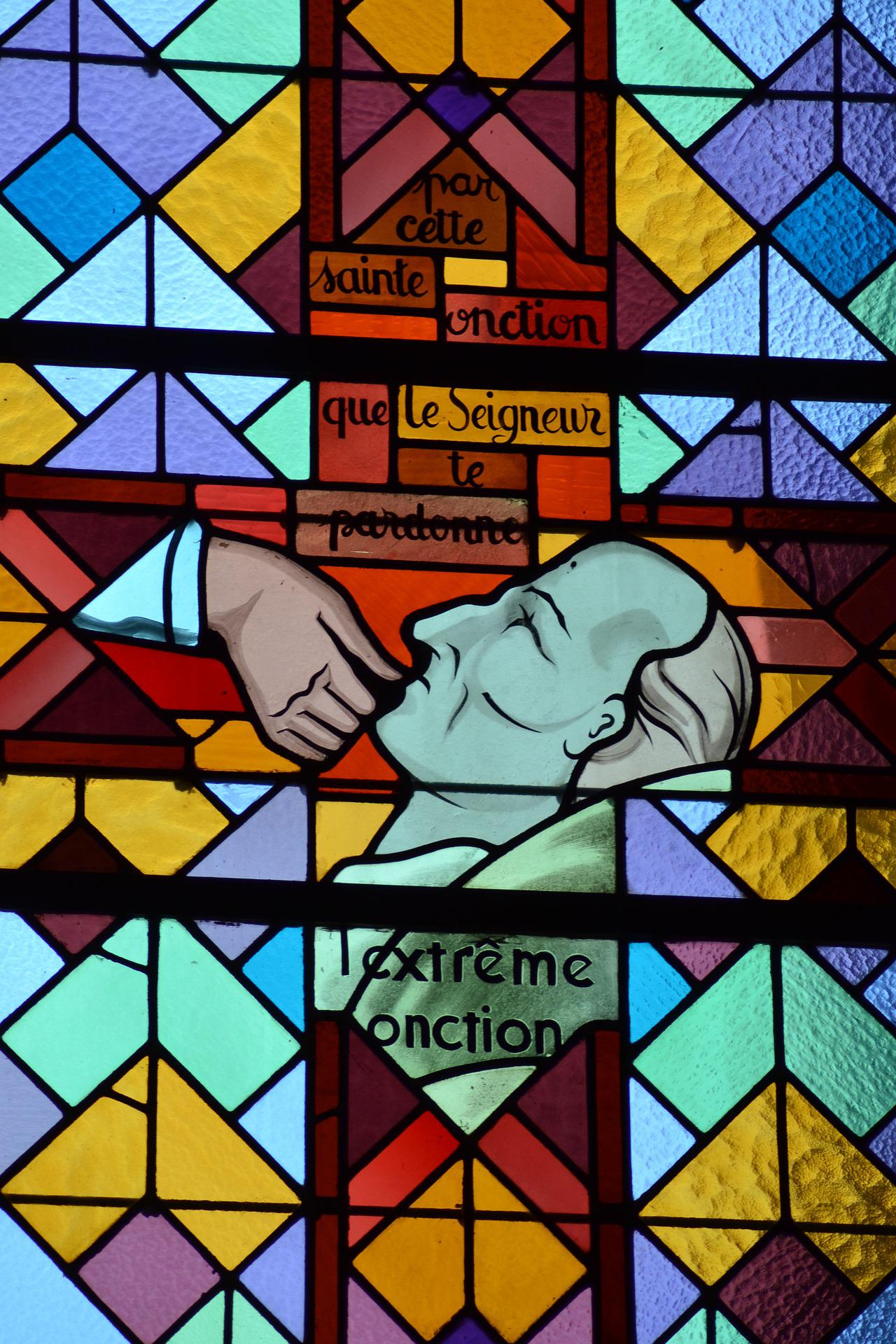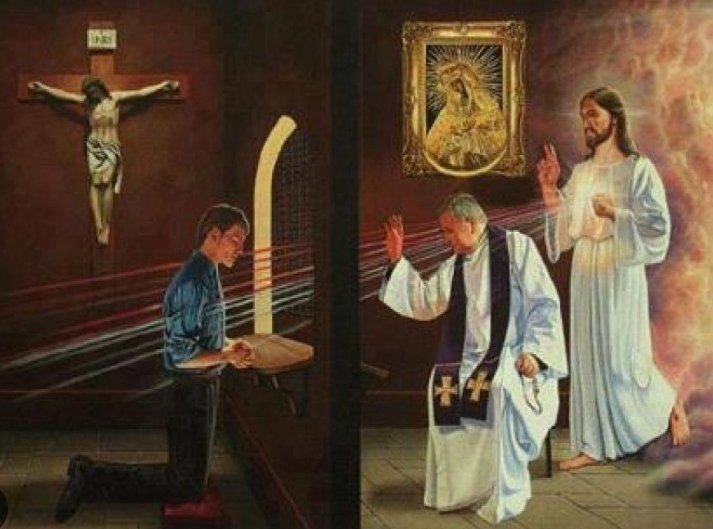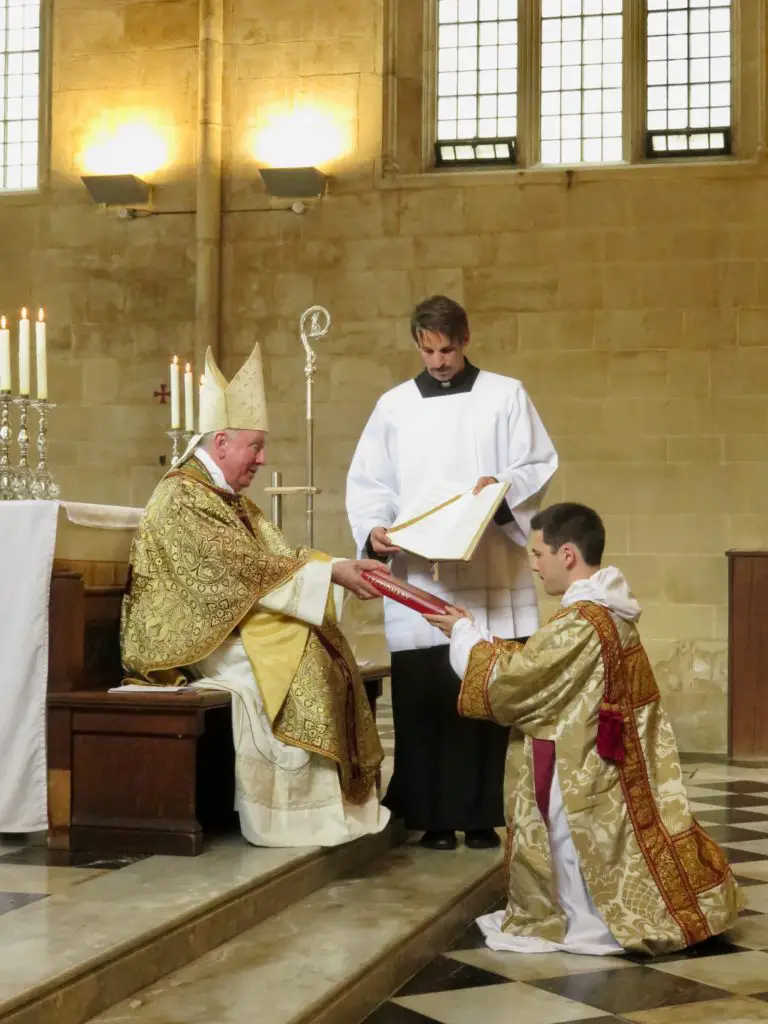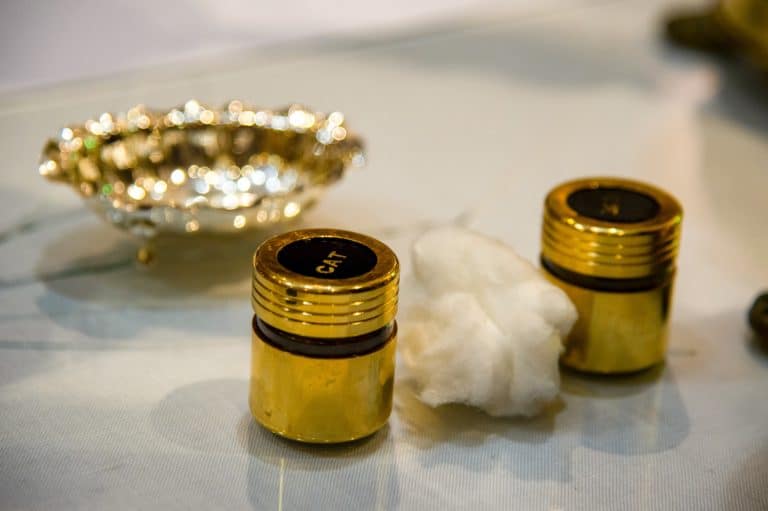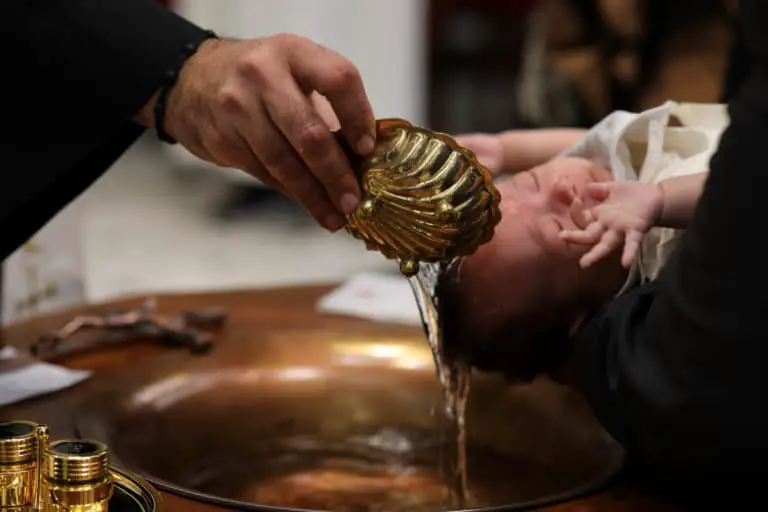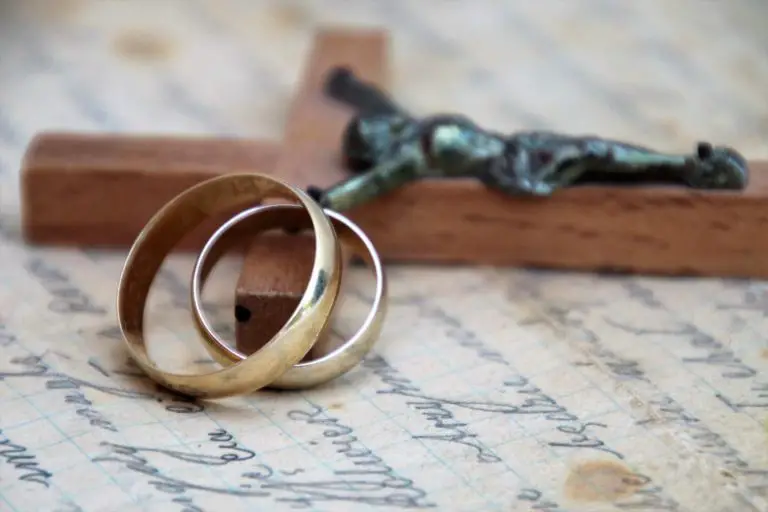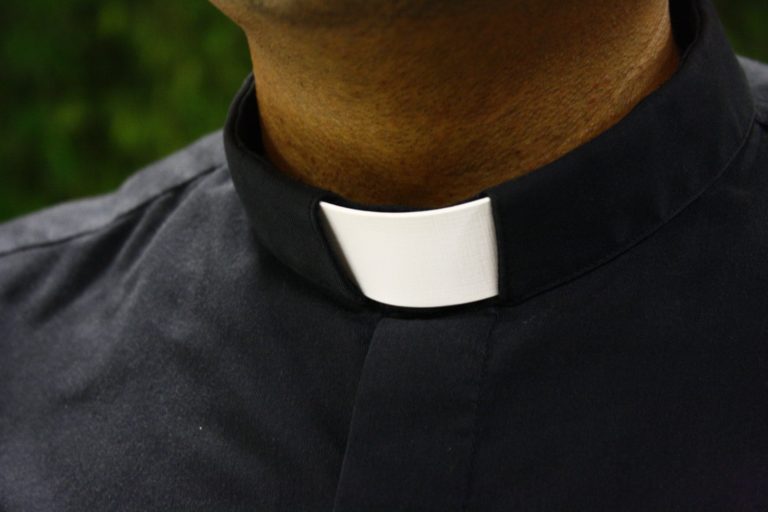What is the Sacrament of Extreme Unction or Anointing of the Sick?
The Sacrament of Extreme Unction or now commonly known as Anointing of the Sick is administered to those in danger of death, dying, of old age or sick which gives spiritual aid,
The Sacrament of Extreme Unction or Extreme Unction is administered by a Priest or Bishop to those in danger of death, elderly, dying or sick. The sacrament is conducted through anointing with blessed holy olive oil, laying of hands and prayers. The Sacrament differs from Viaticum or Last Rites and has the effect of remitting sins, strengthening the souls i.e., spiritual aid and sometimes restoring one’s health.
Approaching the moment of death, the individual is at the most vulnerable moment of his or her mortal existence. Whilst some may approach death with courage in strength, however many even the sick, the elderly and those who are at risk of death can often feel alone, frightened, vulnerable, helpless, and lonely. The realisation that death is near is a very challenging moment and we must all face this reality on our own. Gathered around the dying person may be his or her family and friends, but each must go through this difficult moment alone.
The Catholic Church accompanies each persons’ life and death journey. Commencing in dying to original sin through baptism, as one begins their journey into the Catholic faith. During the time of their first Confession, Holy Communion, Confirmation, and if any of the Sacraments of Service to the community, that is Marriage or Holy orders, are entered. Grace abounds throughout life’s journey. The person may have also chosen a single celibate life.
Can a Motherly Church abandon her children in this most vulnerable time of need?
The Sacrament of Anointing of the Sick (Extreme Action), gives the vulnerable individual the necessary graces that aid the person’s spiritual health, placing grace into their soul, the system in their transition from this mortal life to eternal life, and may at times heal them to better health.
What is the difference between Viaticum and the Sacrament of Extreme Unction or Anointing of the Sick?

As we have mentioned in the opening few paragraphs, the Sacrament of Extreme Unction is also known by the name of the Sacrament of Anointing of the Sick. This is the sacrament by which the person receives the blessed holy oil and the citation of prayers.
Another term, which is associated with the is Viaticum which is Latin meaning ‘provision for a journey’. This is where Holy Communion is given to those who are in immediate danger of death and strengthens them with grace on the journey into eternal life.
Often the Sacrament of Extreme Unction or Anointing of the Sick is accompanied by receiving Holy Communion, especially when the person is in danger of death. This forms part of what Roman Catholics call the Last Rites. That is the final journey
The Catechism of The Catholic Church (CCC) states:
“In addition to the Anointing of the Sick, the Church offers those who are about to leave this
life the Eucharist as viaticum. Communion in the body and blood of Christ, received at this
moment of “passing over” to the Father, has a particular significance and importance. It is
the seed of eternal life and the power of resurrection, according to the words of the Lord:
“He who eats my flesh and drinks my blood has eternal life, and I will raise him up at the
last day.”
The sacrament of Christ once dead and now risen, the Eucharist is here the sacrament of
passing over from death to life, from this world to the Father. (CCC1524)
And further:
“Thus, just as the sacraments of Baptism, Confirmation, and the Eucharist form a unity
called “the sacraments of Christian initiation,” so too it can be said that Penance, the
Anointing of the Sick and the Eucharist as viaticum constitute at the end of Christian life
“the sacraments that prepare for our heavenly homeland” or the sacraments that complete
the earthly pilgrimage. (CCC1525)
Where is the Sacrament of Extreme Unction or Anointing of the Sick in the Bible?
The actions of Jesus (Yeshua which means ‘God saves’ in Hebrew), and throughout His ministry was to save us from sin through his passion, death and resurrection; and to establish many Church practises and rituals that we call sacraments through the Apostles and their successors, ensuring God’s presence is amongst His people from birth through Baptism till death through Anointing of the Sick – God’s Grace is received through these Sacraments.
Jesus healed many through the laying of his hands, forgiveness of sins, raising from the dead and through the casting out of demons.
God, through the Bible, who is the healer, uses His agents to bring about healing to His people. Jesus is the exemplar of God and Man who heals directly and gives authority to His Apostles to do the same.
Here are a several passages to illustrate this point:
“In those days Ezechias was sick unto death: and Isaias, the son of Amos, the prophet, came and said to him: Thus saith the Lord God: Give charge concerning thy house, for thou shalt die, and not live. And he turned his face to the wall, and prayed to the Lord, saying:
I beseech thee, O Lord, remember how I have walked before thee in truth, and with a perfect heart, and have done that which is pleasing before thee. And Ezechias wept with much weeping.
And before Isaias was gone out of the middle of the court, the word of the Lord came to him, saying:
Go back, and tell Ezechias, the captain of my people: Thus saith the Lord, the God of David, thy father: I have heard thy prayer, and I have seen thy tears: and behold I have healed thee: on the third day thou shalt go up to the temple of the Lord. And I will add to thy days fifteen years: and I will deliver thee and this city out of the hand of the king of the Assyrians, and I will protect this city for my own sake, and for David, my servant’s sake.
And Isaias said: Bring me a lump of figs. And when they had brought it, and laid it upon his boil, he was healed. And Ezechias had said to Isaias: What shall be the sign that the Lord will heal me, and that I will go up to the temple of the Lord the third day?
And Isaias said to him: This shall be the sign from the Lord, that the Lord will do the word which he hath spoken: Wilt thou that the shadow go forward ten lines, or that it go back so many degrees?
And Ezechias said: It is an easy matter for the shadow to go forward ten lines: and I do not desire that this be done, but let it return back ten degrees.
And Isaias, the prophet, called upon the Lord, and he brought the shadow ten degrees backwards by the lines, by which it had already gone down on the dial of Achaz”. (2 Kings 20: 1-11).
Jesus heals the daughter of a ruler of the synagogues, had been haemorrhaging for twelve year, when she faithfully touched Jesus’ garment. (St Mark 5: 21-34).
Jesus then raises a man’s daughter from the dead (St Mark 5: 35-43).

Jesus casts out demons from a young boy (St Mark 9:13–28).
Jesus gives sight to a blind man (St John 9:1–41).
St Peter continues to heal in the name of Jesus by giving strength to a man’s limbs who was unable to walk (Acts 3:1–26).
The practice in the Church was considered a sacrament that not only gives healing to the body but also to the spirit and ultimately to the faith.
Here are two main passages that shows the application of the Sacrament in St Mark 6: 12-13:
“And going forth they preached men should do penance:
And they cast out many devils, and anointed with oil many that were sick, and healed them.”.
And in St James 5: 13-15 we read that the practice had become part of the growing Church:
“Is any of you sad? Let him pray: Is he cheerful in mind? Let him sing. Is any man sick among you? Let him bring in the priests of the church and let them pray over him, anointing him with oil in the name of the Lord. And the prayer of faith shall save the sick man. And the Lord shall raise him up: and if he be in sins, they shall be forgiven him.”
Here we read that the Anointing of the Sick through oil and prayer and that the recipient will be raised by the Lord and that his/her sins will be forgiven.
This the understanding of the sacrament today.
Clearly, the Sacrament of Anointing of the Sick has Apostolic succession.
By the twelfth century, the sacrament was known as extreme unction: unction or anointing for those in extremis, at the end of life. The shift had moved from healing to assisting or preparing those in danger of death.
Jonathan Warren P. writes that:
“As a result, the rite also took on an increasingly penitential nature. The Council of Trent in the sixteenth century highlighted the close connection between extreme unction and penance.
In the Council of Florence in the fifteenth century, Pope Eugenius IV ruled that the sacrament “should not be given to the sick unless death is expected.” The dying were to be anointed on the eyes, ears, nostrils, hands, and feet—for the healing of the soul and, occasionally, the body.” (“Extreme Unction,” in Lexham Survey of Theology2018).
What is the ‘matter’ and ‘form’ of the Sacrament of Anointing of the Sick or Extreme Unction?
The Matter in the administration of the sacrament via olive oil along with the actual anointing itself.
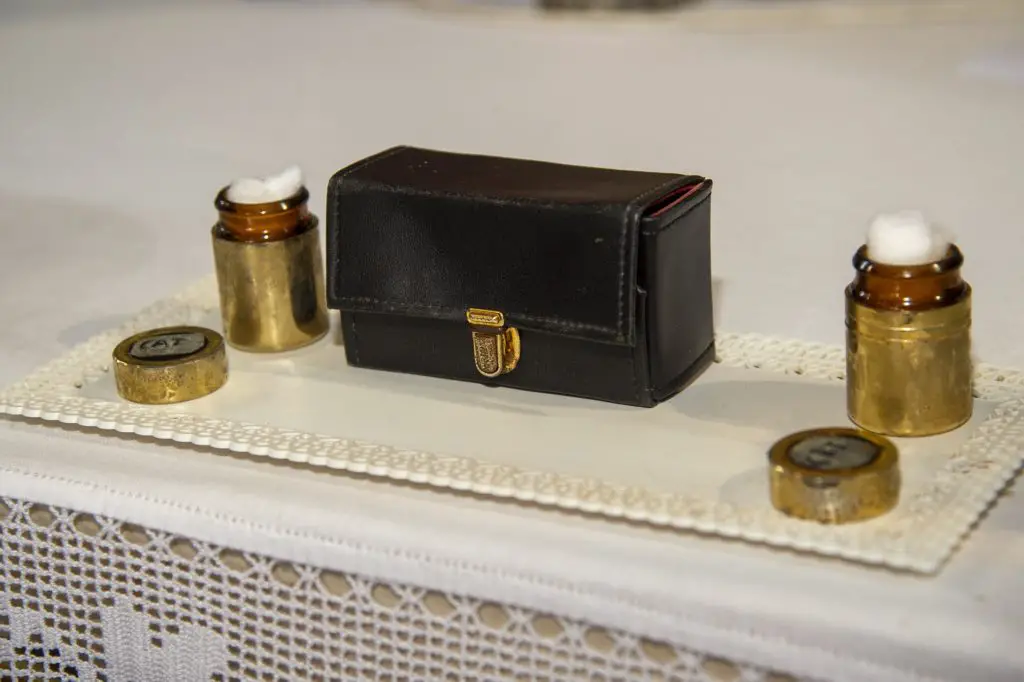
Why oil?
Oil has a known natural effect of healing, pain relief and restores strength and vigour to a person’s body.
The oil is blessed on Holy Thursday by the Bishop and is different from the oil used in Baptism and Confirmation.
The anointing takes place on the recipient’s ears, lips, feet, hands, eye-lids and nostrils.
A shorter version due to necessity is on the forehead.
What is the ‘Form’ of the Sacrament of Anointing of the Sick or Extreme Unction?
The form or words used by the Priest or Bishop are:
“Through this holy anointing may the Lord in his love and mercy help you with the grace of the Holy Spirit. May the Lord who frees you from sin save you and raise you up. Amen.”
Just as the holy women were making their way on the first day of the week, Resurrection Sunday, to anoint the body of Jesus, the Catholic Church values the human body as it is a Temple of the Holy Spirit and is highly esteemed, as the body (united with the soul) will resurrect on the last day to face the General Judgement.
The anointing is a kind of re-consecration of the body and the sense faculties in preparation for the great day.
Why is the Sacrament of Anointing of the Sick or Extreme Unction important?
Whilst the Sacrament of Anointing of the Sick or Extreme Unction is not necessary for salvation, however, should a person in danger of death be in a state of mortal sin, the sacrament is necessary for saving the persons soul from damnation.
It is a sacrament that is available that should never be neglected as it prepares the person for eternal life, and should the person be rightly disposed; Heaven is the eternal destiny.
It is important that this sacrament not be neglected, should a person be seriously ill or in danger of death, the reception of this sacrament is designed for the sick, elderly and those in danger of death; can give health; and gives graces to the recipient depending on the person’s right-disposition.
Do not delay in sending for a priest should you know that a loved one needs the sacrament.
The benefits are eternal.
What are the effects of the Sacrament of Anointing of the Sick or Extreme Unction?
These have been referred to on several occasions throughout the article, but it is worthwhile to have separate section to show their importance.
There are generally four main effects of the Sacrament:
- Gives Sanctifying Grace in the soul
Sanctifying Grace is received or increased in the soul making the soul supernaturally beautiful and dear to God.
2. Remission of Sins
Should the soul have a stain of mortal sin, then these are removed, however should these mortal sins have been confessed already, the sacrament removes the effects of sin and the temporal punishment attached to them.
3. Strengthening of the Soul
The soul is strengthened to combat the final attacks of Satan and his demons. For the evil one will strike during this weakest moment to weaken the soul and cause one to doubt the mercy of God..
4. Restoration of Health
God, (should it be His will) can restoration health to the person, should that be a benefit for salvation of the individual The Sacrament has the effect of giving strength and healing to the body.
St Thomas Aquinas has something to say on these effects:
“Every sacrament is instituted primarily for someone effect, though it may likewise produce other effects as consequences of this one. And in as much as a sacrament produces what it signifies, its primary effect is to be gathered from its signification. Now, this sacrament is administered by way of a cure, just as baptism is administered by way of washing. And a remedy is meant to remove disease. Hence this sacrament is primarily intended to heal the disease of sin.
Hence, just as baptism is a spiritual regeneration, and penance a spiritual raising to life, so extreme unction is a spiritual healing or curing.
But just as the healing of the body presupposes the body to be alive, so does the healing of the soul (medicatio spiritualis) presuppose the life of the soul. And therefore this sacrament is not given as a remedy against defects by which the life of the soul is taken away, e.g. original sin or mortal sin; but against those defects by which a man is spiritually weakened and is deprived of perfect strength for acts of life, grace, and glory; and this defect is nothing but a certain debility and unfitness (ineptitudo) left in us by original or actual sin; and it is against this weakness that man is strengthened by this sacrament. But inasmuch as this strength is given by grace which suffers not the presence of sin, therefore if [the sacrament] finds any mortal or venial sin in the soul, it removes the guilt (culpa) of the sin, provided that the recipient places no obstacle in the way, as already observed in the case of the Eucharist and Confirmation.
And therefore James also speaks of the remission of sin conditionally, saying, ‘If he be in sins, they shall be forgiven him;’ that is to say, as regards guilt; for [the sacrament] does not always blot out sin, because it does not always find it present; but it always remits sin so far as regards the weakness aforesaid, which is called the remains of sin”
(Suppl., q. 30, a. 1).
The Sacrament of Anointing of the Sick plays an integral part of the journey of life into death. Sadly, many neglect this sacrament and devalue its’ importance. The life of every individual is valuable to God, and God wills all to be in Heaven. God has made possible His grace throughout life and it depends on our free-will as to whether we accept or decline them. Never undervalue the Sacrament of Anointing of the Sick, either for yourself or someone else. Yours and my eternity may depend on it.
